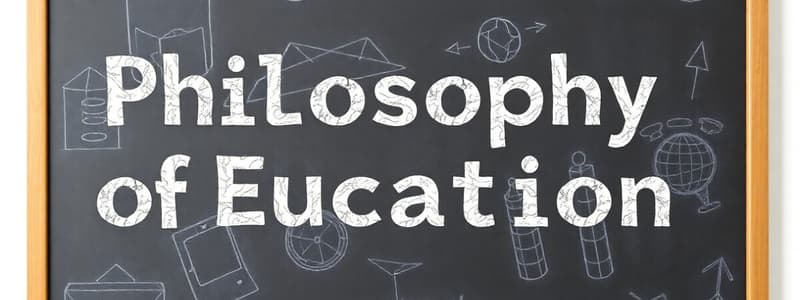Podcast
Questions and Answers
What are the three Latin words from which the term 'education' is derived?
What are the three Latin words from which the term 'education' is derived?
Educare, Educere, and Educatum
How did Socrates define education?
How did Socrates define education?
Education means bringing out latent ideas of universal validity from the mind of every man.
What is Plato's perspective on education?
What is Plato's perspective on education?
Education is the ability to experience pleasure and pain at the right time. It develops the body and soul of the student, culminating in beauty and perfection.
What does Aristotle consider to be the goal of education?
What does Aristotle consider to be the goal of education?
What is John Dewey's definition of education?
What is John Dewey's definition of education?
How did Pestalozzi define education?
How did Pestalozzi define education?
Which of the following is NOT a characteristic of narrow meaning of education?
Which of the following is NOT a characteristic of narrow meaning of education?
Which of the following is NOT a characteristic of broader meaning of education?
Which of the following is NOT a characteristic of broader meaning of education?
Which of the following is NOT a characteristic of formal education?
Which of the following is NOT a characteristic of formal education?
Match the following elements of education with their primary focus:
Match the following elements of education with their primary focus:
Flashcards
What is education?
What is education?
A systematic process where individuals gain knowledge, skills, experience, and positive attitudes.
What does education do for individuals?
What does education do for individuals?
It helps individuals become civilized, cultured, and well-rounded.
Why is education important for society?
Why is education important for society?
Education plays a crucial role in shaping a just and organized society.
What is the ultimate goal of education?
What is the ultimate goal of education?
Signup and view all the flashcards
How is education like 'waking up to life?'
How is education like 'waking up to life?'
Signup and view all the flashcards
How does education help us understand the world?
How does education help us understand the world?
Signup and view all the flashcards
What does 'wholeness' mean in education?
What does 'wholeness' mean in education?
Signup and view all the flashcards
What are the four dimensions of education?
What are the four dimensions of education?
Signup and view all the flashcards
What is the etymological meaning of education?
What is the etymological meaning of education?
Signup and view all the flashcards
How is 'leading out' related to education?
How is 'leading out' related to education?
Signup and view all the flashcards
What is 'training' in the context of education?
What is 'training' in the context of education?
Signup and view all the flashcards
What does 'educatus' mean in simpler terms?
What does 'educatus' mean in simpler terms?
Signup and view all the flashcards
How did the meaning of 'education' change over time?
How did the meaning of 'education' change over time?
Signup and view all the flashcards
What is the current understanding of education?
What is the current understanding of education?
Signup and view all the flashcards
How did Mahatma Gandhi define education?
How did Mahatma Gandhi define education?
Signup and view all the flashcards
What is Tagore's perspective on the purpose of education?
What is Tagore's perspective on the purpose of education?
Signup and view all the flashcards
What did Dr. Zakir Hussain say about the role of education?
What did Dr. Zakir Hussain say about the role of education?
Signup and view all the flashcards
How did Swami Vivekananda view education?
How did Swami Vivekananda view education?
Signup and view all the flashcards
What did Aristotle believe about the relationship between mind and body?
What did Aristotle believe about the relationship between mind and body?
Signup and view all the flashcards
What was Rousseau's view on education?
What was Rousseau's view on education?
Signup and view all the flashcards
What was Herbert Spencer's view on education?
What was Herbert Spencer's view on education?
Signup and view all the flashcards
What did Plato believe about the role of education in shaping emotions?
What did Plato believe about the role of education in shaping emotions?
Signup and view all the flashcards
What was Pestalozzi's vision for education?
What was Pestalozzi's vision for education?
Signup and view all the flashcards
What did Froebel believe about education and the child?
What did Froebel believe about education and the child?
Signup and view all the flashcards
What did TP Nunn believe about the purpose of education?
What did TP Nunn believe about the purpose of education?
Signup and view all the flashcards
What did John Dewey believe about the nature of education?
What did John Dewey believe about the nature of education?
Signup and view all the flashcards
What did Indira Gandhi believe about the role of education?
What did Indira Gandhi believe about the role of education?
Signup and view all the flashcards
How did John Locke compare education to cultivation?
How did John Locke compare education to cultivation?
Signup and view all the flashcards
What is the relationship between education and civilization?
What is the relationship between education and civilization?
Signup and view all the flashcards
Study Notes
Concept, Meaning, Scope, and Importance of Education
- Education is derived from Latin words: Educare (to nourish), Educere (to lead out), and Educatum (teaching method)
- Socrates defined education as bringing out pre-existing ideas within the mind.
- Plato described education as the capacity to feel pleasure and pain at the right moment, developing body and soul's beauty.
- Aristotle defined it as the creation of a sound mind in a sound body.
- John Dewey argued that education is the development of all capacities for controlling the environment and fulfilling responsibilities.
- Pestalozzi believed education is a natural, harmonious, and progressive development of man's innate powers.
Narrow Meaning of Education
- Education is limited to teaching and instruction within schools.
- It starts with school entry and ends with instruction completion.
- Aims to impart knowledge in specific subjects within the confines of textbooks and classroom learning.
- Content is typically focused on academic subjects.
Broader Meaning of Education
- Education is a lifelong process, extending beyond schooling.
- It begins at birth and continues throughout life's experiences.
- Education goes beyond specific attainments and includes general knowledge and sense-making.
- Experiences are vital to education beyond classroom structures.
- Education encompasses overall development of individuals.
Scope of Education
- Educational psychology explores child development, mental health, and the psychological aspects of learning.
- Teaching methods relate to the active participation of learners, and efficient teaching strategies.
- Philosophy of education centers around the aims, nature, and significance of education.
- Educational sociology examines the relationship between society and learning.
Types of Education
- Formal education takes place in schools, typically structured in grades and subjects.
- Informal education includes learning from daily experiences, family, and the environment without formal instruction.
- Non-formal education is planned but separate from the formal school system, focusing on specific skills and knowledge.
Problems and Issues of Education
- Issues like effective management, supervision, and fund allocation are central to successful education systems.
- Studying the historical development of education can better inform contemporary approaches.
- Economic factors of education, like resource allocation and teaching effectiveness also influences the system's strength.
- Environmental factors and the impact on educational development.
- Importance of technological advancements within education systems.
Meaning, Nature, Aims, Functions, and Principles of Education
- Education is a systematic process, enabling individuals to acquire knowledge, skills, attitudes, creating citizens.
- Education as a process of waking up to life, its mysteries, and potential solutions.
- Education is necessary for the individual's wholeness and balanced development.
- Education as the development of human potential.
Etymological Meaning of Education
- The word "education" has roots in Latin words like 'educare', 'educer' and 'educatum'.
- 'Educare' means to nourish/bring out, 'Educere', means to lead out/draw out, and 'Educatum' means methods/styles of teaching.
- The Greek word "pedagogy" is sometimes used to refer to education.
- The common Indian word "shiksha" comes from Sanskrit and means discipline, control, instruct, and teach.
- "Vidya" is derived from Sanskrit for knowledge, highlighting the importance of knowledge acquisition.
Definitions of Education
- Different thinkers have provided diverse perspectives on the significance of education.
- Diverse thinkers like Mahatma Gandhi, Rabindranath Tagore, Zakir Hussain, and Swami Vivekananda, have given their views on education.
- Definitions emphasize knowledge, experience, skills, and positive attitudes.
- Aristotle defined education as the creation of a sound mind in a sound body.
- Rousseau argued that education is the child's development from within.
- John Dewey championed that education is the continuous reconstruction of experience.
Studying That Suits You
Use AI to generate personalized quizzes and flashcards to suit your learning preferences.
Related Documents
Description
Explore the various definitions and perspectives on education, ranging from ancient philosophers to modern views. This quiz covers the scope, meaning, and significance of education in society as articulated by notable thinkers like Socrates, Plato, and Dewey.




